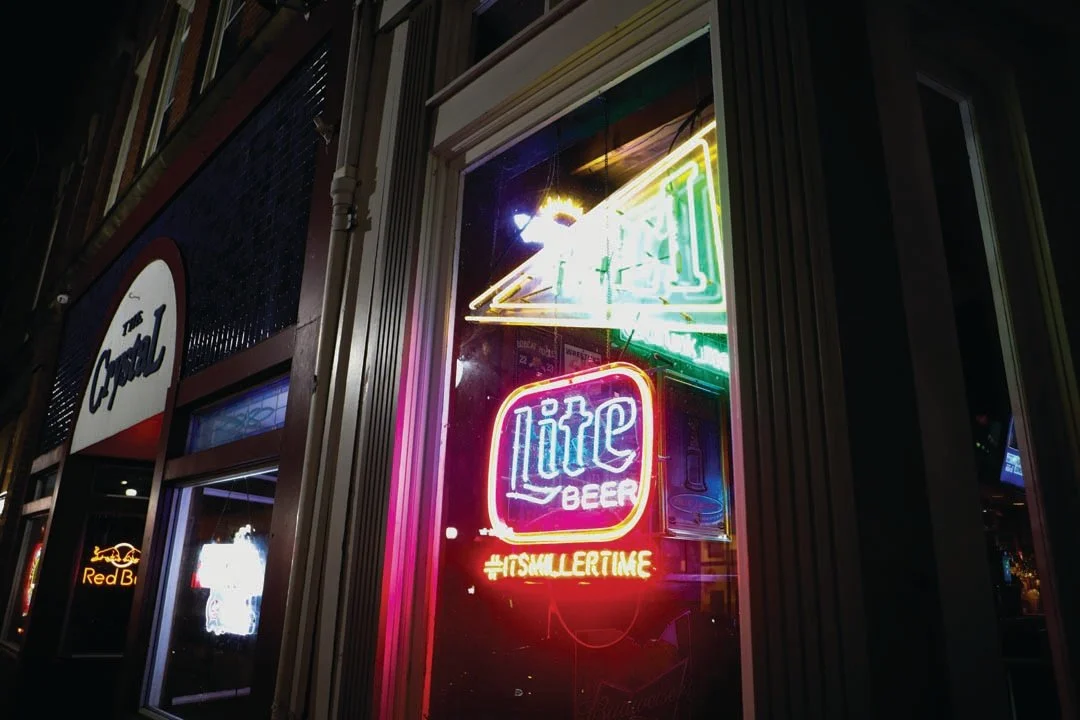Wait, Hold my Beer
Story by Caroline Bissonnette and Josie Donohue
Photos by Ellie Habel and Rachel Rector
Athens happens, or so we’re taught to say; an insight into OU’s party school reputation.
Students party during one of the popular fest weekends in Athens.
“That party last night was awfully crazy, I wish we taped it…” blares from the yards of Ohio University students up and down Mill Street as early as a Friday afternoon, especially when the sun is shining. The song “I Love College” by Asher Roth, released in 2009, highlights one aspect of the college experience that takes many campuses by storm: drinking.
Among the many universities in the state, OU is often referred to as “the party school.” It is no secret that this reputation draws in many high school students looking for rebellion.
Brooklynn Janks, a 2021 graduate who studied communications, says she “was really excited to go to OU because of parties” and that she “was really sheltered growing up.” This combination meant that Janks spent much of her college career out with friends, and she says drinking was often her top priority.
This mindset is not rare among college students. According to a survey conducted by the National Institute on Alcohol Abuse and Alcoholism, “almost 53 percent of full-time college students ages 18 to 22 drank alcohol in the past month and about 33 percent engaged in binge drinking during that same time frame.”
The crowds that take on Court Street every weekend is the indication that OU is no exception to this statistic. Many students spend their free time with a few friends and a liquor pitcher.
The social aspect attached to college drinking can be luring. Participating in potentially damaging behavior is often beneficial for those looking to meet new people and create closer bonds with friends. But it can also act as a catalyst in social development for many people.
According to Thomas Vander Ven, a professor of sociology at OU, a “drinking crisis” refers to something unfortunate that happens as a result of drinking: somebody gets sick from too much alcohol, somebody gets arrested, somebody gets expelled and so on.
“Whenever [drinking crises] happen, your friends come to your support,” Vander Ven says. “That’s part of the positive function of college drinking, is giving you opportunities to demonstrate your adult competence and to take care of each other.”
This comradery is evident among many students who choose to participate in college drinking. This comradery could also be a reason why some students may feel pressure to join their friends at Red Brick on a Saturday night.
With much of OU’s social scene being focused around Court Street, fests and house parties, it can seem like there is not much else to do in the hills of Appalachia. Despite whether or not this is true, strobe lights reflecting off a shiny Miller Lite can may be more appealing to college students than a sporting event or an activity hosted by a student organization.
Signs advertising beer hang outside of a popular Athens bar, The Crystal.
“I think OU is big enough, but circles are still small, and everyone knows everyone,” Janks says. “So, if everyone plans to head to Court Street or Palmer for the weekend, it’s super easy to fall to FOMO since there are very limited things to do to enjoy your free time.”
Being the only person in a crowd of people who does not value drinking in the same way as the others can be mentally draining.
“It is possible to find your group,” Isaiah McIntyre, a junior studying sport management marketing, says. “There are a lot of different organizations for people all over campus that do not go out or don’t drink as much that you can easily be connected with.”
Those that do not crack under the pressure of their partying peers likely do not feel the need to indulge to make friends or memories. One’s college experience depends solely on the decisions they make and their idea of a good time.
Bree Foerster, a senior studying social work, says she does not like the way drinking makes her feel, with which many people, including those packing into bars and parties, may agree.
“I am on the older end of the population of OU students, so I don’t feel the necessity to go out every night,” Foerster says. “I’d prefer a nice evening in with friends or going out and having a couple drinks but not going too crazy.”
Students like Foerster are much less likely to be involved in a drinking crisis and potentially save themselves from other consequences. Overindulgence can have a strong effect on one’s ability to perform well in classes, meaning that participating in drinking activity can be risky behavior.
As the oldest university in the state, students at OU have been risking their academic standing for generations. The multigenerational partying that occurs at various points throughout the year is proof of the passion graduates of the university have for Athens.
Although it is well-known that college students make up most bar frequenters, locals from the area can also be found uptown.
Marti Klinger, an Athens native, has seen the party crowd change over time, as she lives nearby and helped her ex-husband startup popular businesses uptown such as Cats Eye, Goodfella’s and the Smiling Skull when it used to be the Beach Club. She attended Athens High School in the mid-70s when partying during Halloween became popularized, according to The Athens Messenger.
“I think the way it happened is we’d all go uptown and be on Court Street and the cars were parked and it looked crowded, but normal,” Klinger says. “And then at some unknown moment, and I can’t explain it, everybody would go running into the streets and take over.”
A digital archive from the Ohio University library showcasing a print from The Post in October of 1982. This article discusses Ohio University’s reputation with the Halloween holiday.
Klinger laughs as she recalls current college students asking why the “old” people come to parties now. She says, “I always want to say, ‘You wouldn’t have this party if it wasn’t for us!’”
It seems, however, that the party culture has seen a bit of a decrease in popularity in recent years. Partially due to the pandemic, students have not been as intense with their drinking habits as in years past. Janks noticed this trend during her years at OU.
“The fest and party season was insane my freshman spring semester in 2018,” Janks says. “I think fests have declined in attendance and in excitement. I think students are getting better about their drinking, especially with health trends going around on TikTok and social media in general.”
Social media has a great impact on the ways in which people socialize and communicate. Those who grew up with the internet playing a large role in their development now make up the population of college students. This means students at OU are accustomed to using social media as a way to meet people, implying the lack of a need to make friends at Stephens or J Bar.
“We see some recent trends in a reduction in drinking among young people,” Vander Ven says. “They drink less. They have sex less. They drive less. They do all those things less because they don’t have to leave their home in order to have friends and peers and interact with all of them.”
According to a 2015 study by Pew Research Center, 57 percent of teenagers have met a new friend online. Those coming into college have gotten used to using the internet to create relationships, so further growth of social media may inhibit the success of uptown bars and fraternity parties.
The decrease in face-to-face interactions was made easily recognizable by the pandemic but seems to have been gradually occurring already because of technology. The question, at this point, is whether online friendships can stand as tall as a bar-goer gearing up to fight someone on behalf of his fraternity brother.
Although college drinking may come with consequences for those who party irresponsibly or neglect responsibilities, there are valuable life lessons hidden inside every crazy story about “that one time in Athens.”
“Some people think [party culture] is part of the fun of a college campus,” Vander Ven says. “Nobody likes it when someone gets hurt or when somebody experiences acute alcohol toxicity. But the fun of it. The celebration of it. For a lot of us, it’s part of the beauty of Athens.”



